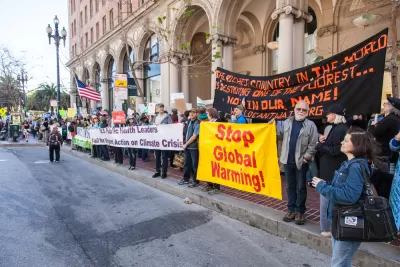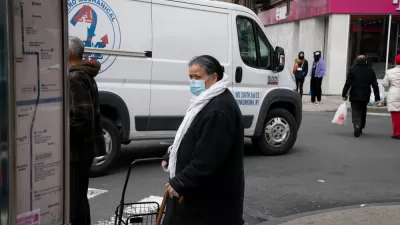Environmental advocacy is not enough. Environmental and social justice must play a role in California's legislative effort to battle climate change, opine two professors from UC Berkeley and USC in the San Francisco Chronicle.

California nearly ended its historic, decade-long legislative effort to fight climate change that began with the passage of the California Global Warming Solutions Act of 2006. Instead, "Gov. Jerry Brown cemented an unexpectedly strong alliance of labor unions, grassroots 'environmental justice' organizations and environmentalists," opine Carol Zabin, who chairs the Donald Vial Center on Employment in the Green Economy at University of California, Berkeley, and Manuel Pastor, professor of sociology and director of the Program for Environmental and Regional Equity at the University of Southern California, in this op-ed for the San Francisco Chronicle.
In the face of business opposition, these groups helped pass SB32, a bill to require a 40 percent emissions reduction by 2030, by pairing it with a companion bill, AB197, designed to ensure that emissions reductions and job benefits actually occur in less advantaged neighborhoods.
Zabin, Pastor, Abigail Martin, and Jim Sadd authored research released on September 13 on the pairing of labor and environmental justice groups to fight climate change in California.
According to Zabin and Pastor, "Research has shown that incentives for residential rooftop solar and clean cars have gone disproportionately to more affluent people, forcing those left out to advocate separate programs for renters and low-income drivers." On the labor front, unions question whether jobs in the "low-carbon sector" will pay as high as those in "conventional energy infrastructure."
The climate equity agenda was also key to a $900 million agreement struck between Gov. Jerry Brown and legislative leaders on how to spend cap-and-trade revenues in the Greenhouse Gas Reduction Fund.
Per the governor's press release of Sept. 14:
"These cap-and-trade investments will help spur innovation of all kinds to curb carbon pollution," said Governor Brown at a signing ceremony in downtown Fresno, where cap-and-trade proceeds are helping to improve bus rapid transit services and access to affordable housing.
Zabin and Pastor acknowledge that "[s]ocial equity and emissions reductions are not always easy to pair."
One example is community-scale solar, which involves decentralized, midsize solar projects that are larger and thus lower-cost than solar rooftop on individual homes. Community solar can be located in poor areas, does not require homeownership, and can be contracted to include prevailing wage standards and entry into apprenticeship programs for local residents.
Engaging workers and disadvantaged communities will be key to future climate legislative successes, conclude Zabin and Pastor.
Related research:
- California Environmental Justice Center: New Report Highlights Equity Flaws in California’s Cap-and-Trade Program, September 14, 2016
- UC Berkeley Labor Center: Advancing Equity in California Climate Policy: A New Social Contract for Low-Carbon Transition, September 13, 2016
- UC Berkeley Labor Center: The Link Between Good Jobs and a Low Carbon Future, July 12, 2016
Related on Planetizen:
Social Equity: The Missing Leg of the Three-Legged Stool of Climate Action, March 13, 2016
FULL STORY: Embrace equity to win on climate goals

Maui's Vacation Rental Debate Turns Ugly
Verbal attacks, misinformation campaigns and fistfights plague a high-stakes debate to convert thousands of vacation rentals into long-term housing.

Planetizen Federal Action Tracker
A weekly monitor of how Trump’s orders and actions are impacting planners and planning in America.

In Urban Planning, AI Prompting Could be the New Design Thinking
Creativity has long been key to great urban design. What if we see AI as our new creative partner?

King County Supportive Housing Program Offers Hope for Unhoused Residents
The county is taking a ‘Housing First’ approach that prioritizes getting people into housing, then offering wraparound supportive services.

Researchers Use AI to Get Clearer Picture of US Housing
Analysts are using artificial intelligence to supercharge their research by allowing them to comb through data faster. Though these AI tools can be error prone, they save time and housing researchers are optimistic about the future.

Making Shared Micromobility More Inclusive
Cities and shared mobility system operators can do more to include people with disabilities in planning and operations, per a new report.
Urban Design for Planners 1: Software Tools
This six-course series explores essential urban design concepts using open source software and equips planners with the tools they need to participate fully in the urban design process.
Planning for Universal Design
Learn the tools for implementing Universal Design in planning regulations.
planning NEXT
Appalachian Highlands Housing Partners
Mpact (founded as Rail~Volution)
City of Camden Redevelopment Agency
City of Astoria
City of Portland
City of Laramie




























